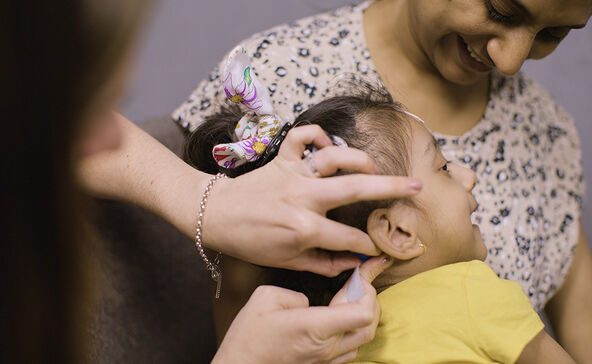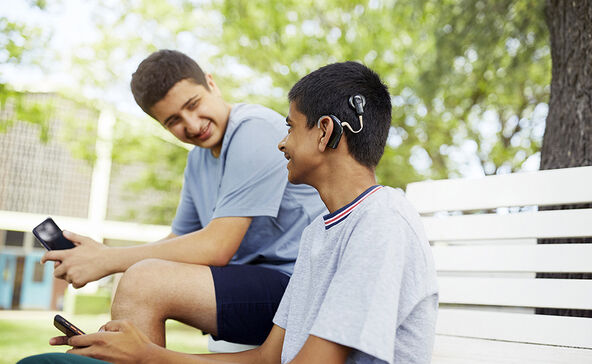Your child can access a world of sound
For babies and toddlers, a cochlear implant can open up access to a world of sound, help them develop critical speech, language and listening skills, and give them the confidence to explore their world. From the first time your baby hears your voice, they are beginning to listen and learn about the world around them and starting on their journey to critical early language and speech development.
For babies and toddlers who are deaf or hard of hearing, this journey can be challenging. The earlier a child has access to sound, the more likely they are to reach their hearing potential.
A cochlear implant can be a suitable option for infants as young as 3 months, ensuring your child has the same opportunity to develop listening and language as their hearing peers.
- 1 in 1,000
- It's estimated that 1 in 1,000 babies in Australia is born with significant hearing loss.
- 2 in 1,000
- By school age, that number is 2 in 1,000. By secondary school, 3 in 1,000 children require assistance because of hearing loss.
Is a cochlear implant right for your child?
While outcomes will differ for each child, a cochlear implant combined with early intervention, gives your child the best chance of:
- Having hearing stability throughout their life
- Achieving the expected language and speech outcomes for their age
- Requiring fewer hearing supports later in life.
We understand that as a parent, guardian or caregiver, a decision that involves your child’s health is never made lightly, and that’s why we're with you and your family, from the very beginning.
Every family is different and whether a cochlear implant is suited to your child will depend on the type of hearing loss, your family needs and your wishes for their future.
We'll only suggest a cochlear implant for your child when we have determined that it can achieve the best possible outcomes, and that an implant aligns with your family’s goals and wishes.
Through consultation with experts, meeting other families who have received cochlear implants, and taking part in information sessions, you'll have the opportunity to ask questions about costs, additional services and discuss your concerns.
Ultimately, the decision is yours and we support whatever decision you make for your child. If you decide not to proceed with a cochlear implant, we'll continue to support you and your child with the right mix of hearing and communication services to support their needs.
Get in touch with our Client Care team.
ContactAssessment for cochlear implants
This stage can include testing to understand how your child’s hearing is functioning and how they respond to sound. These are safe and non-invasive tests, performed by an audiologist, speech pathologist or specialist teacher through age-appropriate activities and play.
Testing can include:
Auditory Brainstem Response (ABR) testing
Performed by an audiologist to determine how a child’s brain responds to sound. It's done by wearing entirely safe external sensors during sleep.
Visual Response Orientation Audiometry (VROA)
Performed by an audiologist to determine how your child responds to sound when awake. Sound is played through headphones and your child is given age-appropriate visual rewards to encourage and support responses in a play-based environment.
Behavioural Observation Audiometry (BOA)
An alternative to VROA, often used for infants and children who can't physically turn towards the sound. It involves an audiologist observing how your child or infant responds to audio cues.
Aided Cortical Assessment Testing
This measures how your child’s brain responds to sound when awake. It's entirely safe and uses external electrodes to measure brain activity when a series of sounds are played.
Every child is different, and it depends on your child’s hearing loss and individual circumstances and needs.
We'll keep you informed of any testing your child requires and give you opportunities to access further information and ask any questions before testing takes place.
Experts in early intervention
We are world leaders in paediatric cochlear implantation. We build a dedicated, expert team around your family, focused on helping your child reach their goals. If you decide to proceed with a cochlear implant, you'll have a tailored team of professionals in your corner who support your child and your family every step of the way. Our specialists will create an individual program for your family, designed to give your child the support they need from birth onwards. The program can be designed to support all children who are deaf or hard of hearing, including those with complex diagnoses or additional disabilities.
Coordinated by a key worker, your dedicated consultant ensures you can access the services your child needs, your program can include:
- speech, listening and communication therapies
- occupational and physical therapies
- access to assistive technologies
- family support services
- in-classroom support at your child’s day care or preschool, playgroups and parent meet-ups
- Connected Services delivered at home for those who cannot access a NextSense centre high-quality interpreting services, if required, so you can access services in the language you choose.







